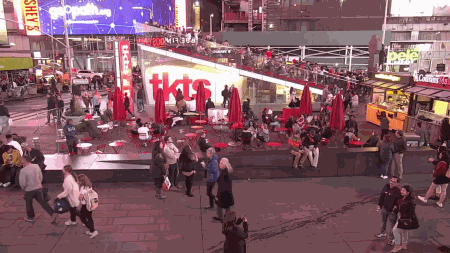OpenCV real time streaming video capture is slow. How to drop frames or get synced with real time?
Solution 1

My hypothesis is that the jitter is most likely due to network limitations and occurs when a frame packet is dropped. When a frame is dropped, this causes the program to display the last "good" frame which results in the display freezing. This is probably a hardware or bandwidth issue but we can alleviate some of this with software. Here are some possible changes:
1. Set maximum buffer size
We set the cv2.videoCapture() object to have a limited buffer size with the cv2.CAP_PROP_BUFFERSIZE parameter. The idea is that by limiting the buffer, we will always have the latest frame. This can also help to alleviate the problem of frames randomly jumping ahead.
2. Set frame retrieval delay
Currently, I believe the read() is reading too fast even though it is in its own dedicated thread. This may be one reason why all the frames appear to pool up and suddenly burst in the next frame. For instance, say in a one second time interval, it may produce 15 new frames but in the next one second interval, only 3 frames are returned. This may be due to the network packet frame loss so to ensure that we obtain constant frame rates, we simply add a delay in the frame retrieval thread. A delay to obtain roughly ~30 FPS does a good job to "normalize" the frame rate and smooth the transition between frames incase there is packet loss.
Note: We should try to match the frame rate of the stream but I'm not sure what the FPS of the webcam is so I just guessed 30 FPS. Also, there is usually a "direct" stream link instead of going through a intermediate webserver which can greatly improve performance.
If you try using a saved .mp4 video file, you will notice that there is no jitter. This confirms my suspicion that the problem is most likely due to network latency.
from threading import Thread
import cv2, time
class ThreadedCamera(object):
def __init__(self, src=0):
self.capture = cv2.VideoCapture(src)
self.capture.set(cv2.CAP_PROP_BUFFERSIZE, 2)
# FPS = 1/X
# X = desired FPS
self.FPS = 1/30
self.FPS_MS = int(self.FPS * 1000)
# Start frame retrieval thread
self.thread = Thread(target=self.update, args=())
self.thread.daemon = True
self.thread.start()
def update(self):
while True:
if self.capture.isOpened():
(self.status, self.frame) = self.capture.read()
time.sleep(self.FPS)
def show_frame(self):
cv2.imshow('frame', self.frame)
cv2.waitKey(self.FPS_MS)
if __name__ == '__main__':
src = 'https://videos3.earthcam.com/fecnetwork/9974.flv/chunklist_w1421640637.m3u8'
threaded_camera = ThreadedCamera(src)
while True:
try:
threaded_camera.show_frame()
except AttributeError:
pass
Related camera/IP/RTSP/streaming, FPS, video, threading, and multiprocessing posts
-
Python OpenCV streaming from camera - multithreading, timestamps
-
Video Streaming from IP Camera in Python Using OpenCV cv2.VideoCapture
-
OpenCV real time streaming video capture is slow. How to drop frames or get synced with real time?
Solution 2
Attempt at threading
I've attempted this solution from nathancy with minor success.
It involves:
- creating a separate thread for image capture from the source
- using the main thread exclusively for display.
Code:
import cv2
from threading import Thread
class ThreadedCamera(object):
def __init__(self, source = 0):
self.capture = cv2.VideoCapture(source)
self.thread = Thread(target = self.update, args = ())
self.thread.daemon = True
self.thread.start()
self.status = False
self.frame = None
def update(self):
while True:
if self.capture.isOpened():
(self.status, self.frame) = self.capture.read()
def grab_frame(self):
if self.status:
return self.frame
return None
if __name__ == '__main__':
stream_link = "https://videos3.earthcam.com/fecnetwork/9974.flv/chunklist_w1421640637.m3u8"
streamer = ThreadedCamera(stream_link)
while True:
frame = streamer.grab_frame()
if frame is not None:
cv2.imshow("Context", frame)
cv2.waitKey(1)
Jittery, but real-time results
 .
.
The streaming works. It maintains real-time. However, it is as if all the frames pool up and suddenly burst into the video. I would like somebody to explain that.
Room for improvement
The real-time stream can be found here.
https://www.earthcam.com/usa/newyork/timessquare/?cam=tsstreet
This site is scraped for the m3u8 using python's streamlink stream scraper.
import streamlink
streams = streamlink.streams("https://www.earthcam.com/usa/newyork/timessquare/?cam=tsstreet")
print(streams)
which yeilds:
OrderedDict([
('720p',<HLSStream('https://videos3.earthcam.com/fecnetwork/9974.flv/chunklist_w202109066.m3u8')>),
('live', <RTMPStream({'rtmp': 'rtmp://videos3.earthcam.com/fecnetwork/', 'playpath': '9974.flv', 'pageUrl': 'https://www.earthcam.com/usa/newyork/timessquare/?cam=tsstreet','swfUrl': 'http://static.earthcam.com/swf/streaming/stream_viewer_v3.swf', 'live': 'true'}, redirect=False>),
('worst', <HLSStream('https://videos3.earthcam.com/fecnetwork/9974.flv/chunklist_w202109066.m3u8')>),
('best', <RTMPStream({'rtmp': 'rtmp://videos3.earthcam.com/fecnetwork/', 'playpath': '9974.flv', 'pageUrl': 'https://www.earthcam.com/usa/newyork/timessquare/?cam=tsstreet', 'swfUrl': 'http://static.earthcam.com/swf/streaming/stream_viewer_v3.swf', 'live': 'true'}, redirect=False>)
])
The possibility that the streams are being read wrong.
Conic
Updated on October 15, 2020Comments
-
Conic over 3 years
Goal and problem
I'd like to set up an opencv system to process either HLS streams or RMTP streams, however, I am running into a strange issue regarding a reduced frame-rate and an accumulating lag. It's as if the video gets further and further behind from where it is supposed to be in the stream.
I'm looking for a way to keep up to date with a live source even if it means dropping frames.
Current approach
import cv2 cap = cv2.VideoCapture() cap.open('https://videos3.earthcam.com/fecnetwork/9974.flv/chunklist_w1421640637.m3u8') while (True): _, frame = cap.read() cv2.imshow("camCapture", frame) cv2.waitKey(1)I've validated the quality of the stream on VLC and it seems to work fine there.
cv2 speed
 .
. realistic/expected speed

Questions:
- What am I doing wrong here?
- Why is it so slow?
- How do I sync it to real-time speeds?
-
Conic over 4 yearsCan you tell me why the waiting (FPS syncing) is needed? Isn't the point of the buffer to capture frames as they come? It feels like it wouldn't matter what is grabbed from the top of the buffer. Building an artificial delay feels counterintuitive for me. Would that be about resource sharing in threads or something? Or is it that the images don't come in real-time exactly, but as they're able to be reconstructed or re-delivered. Either way, thank you for the detailed response. This works very well.
-
 nathancy over 4 years@Conic The FPS syncing is needed because generally you want to sync with the source. If you are polling too slow, you will have periods where you don't have a new frame so you will be displaying the old frame. If you poll too fast (like before), you will display all the frames instantly. In both cases, this may cause the jitter/freeze so by inserting a delay, you can even out the frame distribution as it is displayed. Since there are two separate threads, once a frame is received, it is immediately displayed so that's another reason why we need a delay.
nathancy over 4 years@Conic The FPS syncing is needed because generally you want to sync with the source. If you are polling too slow, you will have periods where you don't have a new frame so you will be displaying the old frame. If you poll too fast (like before), you will display all the frames instantly. In both cases, this may cause the jitter/freeze so by inserting a delay, you can even out the frame distribution as it is displayed. Since there are two separate threads, once a frame is received, it is immediately displayed so that's another reason why we need a delay. -
 nathancy over 4 yearsHere's an analogy, say you're watching a Youtube video on 2x speed but you are using dial-up internet. The buffer rate will load slower than the video actually playing so eventually, the frames will catch up to the buffer and the video will freeze. This is what happens when the FPS is not synced. If we revert back to 1x speed, then the frames will be evened out and match the speed of the buffer rate so we don't get any freezing/jitter. The video then looks smooth
nathancy over 4 yearsHere's an analogy, say you're watching a Youtube video on 2x speed but you are using dial-up internet. The buffer rate will load slower than the video actually playing so eventually, the frames will catch up to the buffer and the video will freeze. This is what happens when the FPS is not synced. If we revert back to 1x speed, then the frames will be evened out and match the speed of the buffer rate so we don't get any freezing/jitter. The video then looks smooth -
Christoph Rackwitz over 3 yearsOpenCV VideoCapture isn't polling at all. could you explain what you mean?
-
sur0k about 3 years@ChristophRackwitz actually it's polling in the
update()which is called inside started thread:Thread(target=self.update, args=()) -
Kenji Noguchi almost 3 yearsyah
capture.read()inside of infinite loop is polling. -
Arunava over 2 yearsDid you find a solution to this?
-
Conic over 2 yearsYes I did. It's the answer with the green checkmark next to it from nathancy.
-
Arunava over 2 yearsOops sorry. Since you said nathancy's answer was a minor success. I thought you meant the answer to this question (didnt check the link). Anyway. Thanks.
-
Conic over 2 yearsI can see how that might be misleading. I was referring to a different solution of his from another stack overflow post. He then responded with an updated answer that did FPS syncing. That ended up being the solution that worked for me.
-
Arunava over 2 yearsYeah. Thanks :)
-
 nathancy over 2 yearsIt's constantly polling. The entire operation of capturing frames is put inside the thread so that if the program is exited, the capture operation will not hang as a zombie process. If we don't set
nathancy over 2 yearsIt's constantly polling. The entire operation of capturing frames is put inside the thread so that if the program is exited, the capture operation will not hang as a zombie process. If we don't setdaemontoTrue, it will be a zombie process when your main program dies. We set daemonTrueso that when our parent process dies, this will also kill all child processes. See threading documentation for more information -
Ben Zayed over 2 yearsCould you please explain to me why you used a threaded camera. I set a maximum buffer size and a frame retrieval delay as you suggested and that was enough to get a smooth streaming.
-
 nathancy over 2 years@BenZayed For a single camera just setting buffer size and delay should work but if you have multiple cameras running simultaneously you may need to use threading (I use this technique with 8 simultaneous camera streams)
nathancy over 2 years@BenZayed For a single camera just setting buffer size and delay should work but if you have multiple cameras running simultaneously you may need to use threading (I use this technique with 8 simultaneous camera streams)